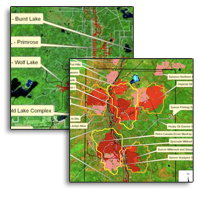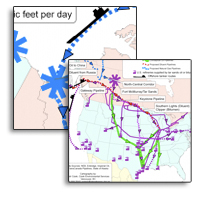Tar Sands 101
The Tar Sands "Gigaproject" is the largest industrial project in human history and likely also the most destructive. The tar sands mining procedure releases at least three times the CO2 emissions as regular oil production and is slated to become the single largest industrial contributor in North America to Climate Change.
The tar sands are already slated to be the cause of up to the second fastest rate of deforestation on the planet behind the Amazon Rainforest Basin. Currently approved projects will see 3 million barrels of tar sands mock crude produced daily by 2018; for each barrel of oil up to as high as five barrels of water are used.
Human health in many communities has seriously taken a turn for the worse with many causes alleged to be from tar sands production. Tar sands production has led to many serious social issues throughout Alberta, from housing crises to the vast expansion of temporary foreign worker programs that racialize and exploit so-called non-citizens. Infrastructure from pipelines to refineries to super tanker oil traffic on the seas crosses the continent in all directions to allthree major oceans and the Gulf of Mexico.
The mock oil produced primarily is consumed in the United States and helps to subsidize continued wars of aggression against other oil producing nations such as Iraq, Venezuela and Iran.
To understand the tar sands in more depth, continue to our Tar Sands 101 reading list
Syncrude pockets $18.5B bonanza
Syncrude pockets $18.5B bonanza
Liberals slam 'sweet deal' negotiated in 1997 worth billions of dollars to oilsands producers
Darcy Henton, The Edmonton Journal
February 24, 2009
Oilsands giant Syncrude stands to earn a extra $18.5 billion over the life of its operations as a result of cashing in late last year on a royalty option it negotiated more than a decade earlier with the Alberta government, says Liberal MLA and energy critic Kevin Taft.
It’s time to rethink harmful tar sands projects
It’s time to rethink harmful tar sands projects
By Roy Strang - Peace Arch News
February 17, 2009
There may, after all, be a small silver lining in the dark fiscal cloud hanging over us.
It’s so small that it’s hard to discern amidst the monetary gloom, but it’s there nonetheless.
"Tar sands producers stuck over a barrel"
The unspoken part of this "unpalatable" duality is that green-minded folks have just such an equally repulsive "choice". Either be "unreasonable" and "not a part of the solution" by pointing out that CCS and all other Climate Change in the tar sands "solutions" are nonsense, especially when one sees the forms of emissions yet to come from the In Situ developments. There is no solving the climate crisis, preventing deforestation, preserving the Mackenzie River Basin or using the remaining natural gas on Turtle Island in a sane manner-- unless we also prevent the tar sands from operating.
Alberta gets fresh black eye with tar sands coverage
Alberta gets fresh black eye with oilsands coverage
By Kelly Cryderman, Canwest News ServiceFebruary 22, 2009
CALGARY - It seems the Alberta government can't catch a break.
To add to the long list of international publications that have focused on the environmental costs of the oilsands, National Geographic chose its March edition to splash images of the development - with at least four pictures depicting unsightly tailings ponds - across its pages alongside an article.
[Keystone] "Pipeline could bring needed revenue to state" (S. Dakota)
Pipeline could bring needed revenue to state
By Aaron Nelson
Black Hills Pioneer
BELLE FOURCHE - A crude oil pipeline that would become the longest in North America and could bring much needed revenue and as many as 2,000 workers to the western region of the state would pass through Butte County, officials told county commissioners on Wednesday.
Pipeline leak in northeastern B.C. was not sabotage
Pipeline leak in northeastern B.C. was not sabotage
Friday, February 20, 2009
CBC News
Two pipeline workers were injured by a leak in a northeastern B.C. natural gas pipeline, but the incident was not another case of sabotage, an official said.
Spectra Energy spokeswoman Rosemary Silva said Friday two workers were doing routine maintenance on a 45-centimetre pipeline when the breach occurred.
The two workers were taken to hospital with minor injuries and one was later released, she said.
Rhetoric and Reality Clash on Obama's First Foreign Visit
POLITICS: Rhetoric and Reality Clash on Obama's First Foreign Visit
By Chris Arsenault
VANCOUVER, Feb 20 (IPS) - On his first foreign visit as U.S.
president, Barack Obama's rhetoric of "hope" and "change" came face to
face with the hard, divisive policy realities of climate change from
Canada's tar sands, a growing insurgency in Afghanistan and the
sputtering world economy.
Some 2,500 spectators lined the streets of Ottawa to watch the
president's motorcade make its way to Parliament Hill, a marked
The anti-tar sands industry
Such an article as the one below is a very good thing to see, in a certain sense. It means, of course, that stage one & two of social action against the tar sands have now been passed: stage one is they ignore you, and two is they ridicule you. Three, of course-- so goes the old saying, anyhow-- is that we are violently opposed.
Two people reportedly hurt in pipeline blast near Fort St. John
If this is not a set-up by the RCMP and/or associated folks, then the bomber is a moron. Either way, this will be used to come after dissent, especially mere moments after the announcement that security costs wold go up five times the planned amount for 2010. The need is for "security" forces to have something to be "secure" from.
--M
Two people reportedly hurt in pipeline blast near Fort St. John
Canwest News Service
February 20, 2009
Damage caused to a natural gas pipeline is seen east of Dawson Creek in this October 12, 2008 photo.
Photograph by: Canwest News Service
Baker Lake hunters, elders oppose uranium mine
Baker Lake hunters, elders oppose uranium mine
"Like part of their spirit."
February 20, 2009
JOHN BIRD
Joan Scottie was on the front lines 20 years ago when the community of Baker Lake said an historic "no" to uranium mining - and she's still fighting the same battle today.
But this time, key Inuit organizations have switched sides.
"I'm frustrated with our aboriginal organizations," Scottie said. "They are the ones who are supposed to represent us. Instead, they are getting revenue in millions of dollars from the mining companies for our hunting grounds."



